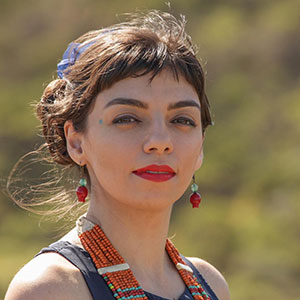
The Migrating Musician
Persian Classical musician Gelareh Pour explores how identity, its cultural challenges and liberties, is vital to her music-making in today’s world.
What does it mean to be who you are?

Whilst identity relates to basic values that dictate the choices we make, choices that reflect who we are. How do we define ourselves when decision is thrust upon us? Whether through political climate or any other means of instinctive survival, choice is not always necessarily our own.
We adapt, we grow, and we change in response to what the world puts in front of us. Considering the acclimatising nature of the human self; who are you? How do you express that?
For the migrating musician this is a considerable quandary. When attempting to express the truest sense of your being you always ask yourself; are you where you’re from? Or are you where you are? Whilst some may comfortably fit into either category, a traditionalist or a contemporary, there is an interesting and inspired in-between that when traversed produces what is arguably the most genuine representation of artistic multi-culturalism.
And so, this is where I find myself. An Iranian-born Australian citizen, classically trained in Persian music, finding my stage in Australia. I’m unable to sing live unaccompanied in Iran as a female, deemed to be too provocative by the current Iranian government, so I’ve sought refuge in Australia, where I continue to find new and exciting ways to share my passion for all forms of music.
As much as I am where I’m from, Iran will always be a part of me, I’m an Australian citizen and I have a love for this country and all it has taught me.
For me, creating new music is about self-expression, it’s about showing the world who you are and opening a dialogue around that. I have a unique approach to my music, I’m determined to move forward and to embrace the challenges and opportunities that will help define me, I’m from more than one place, I am multicultural.
Enter Garden Quartet, my latest representation of Iranian-Australian music. Garden is a place of growth; a testament to the notion that any seed given good soil and a healthy dose of love can bloom into something otherworldly.
My aim with Garden is to take my classical Persian past and frame it with the diversity of contemporary Australian music to produce something celebrative of traditional Iran and yet uniquely illustrative of modern Australia.
For any musician with a diverse range of influences, describing what your music sounds like is a difficult task, especially if the music you’re creating is new to yourself. I’ve read one description; ‘Garden Quartet are a blend of traditional Iranian music and contemporary western music’, and yet for me, that description doesn’t come close to illuminating the depth of emotion and personal story involved.
Often musicians are compared to their contemporaries. I’ve also heard Garden described as being like Nick Cave’s Bad Seeds if you replaced Warren Ellis with Kayhan Kalhor and fronted the group with a Persian version of Diamanda Galas. And still, as personally flattering as that is, it still doesn’t quite encapsulate the true essence of the group.
With Arman Habibi delivering ethereal Persian poetry sung in Farsi, backed by Mike Gallichio’s pop sensibilities and Brian O’Dwyer’s sensitive percussion, we take influence from Meshkatian to Mark Hollis, from Ramesh to Dirty Three; I even have tickets to see Metallica later this year. But really, none of that matters. First and foremost, Garden Quartet is about bringing different cultures together and seeing what that sounds like, without trying to be anything in particular. It is what it is, and we are who we are. It’s probably best you come along and see for yourself.
Garden Quartet provides a unique listening experience that captures classical Iran through the lens of modern Australia. They release their self-titled debut album in June followed by a national tour in July. Click here for more info on Gelareh Pour and Garden Quartet.

